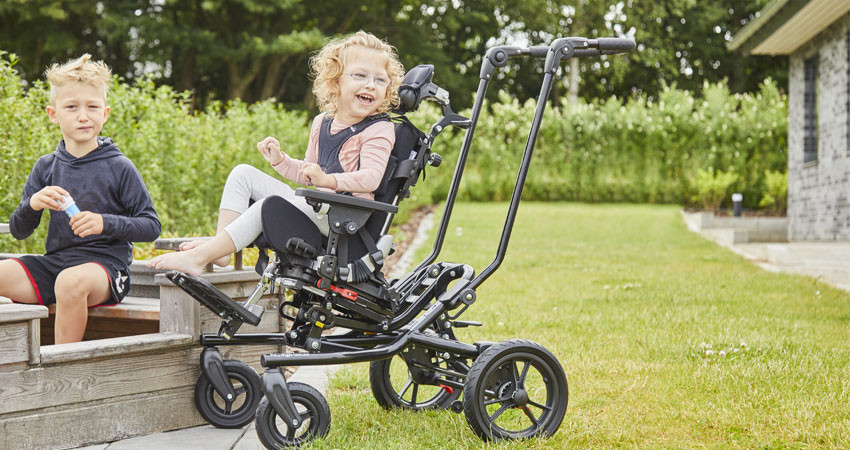
Meet Alma
Using the x:panda on the High-low:xo frame, Alma was able to join in with her brother, Theodor, at the sandbox and it also enabled Alma’s mother to adjust the position of Alma so she could do her hair without having to bend down.
We had the pleasure of visiting Alma, her big brother Theodor and her mother Inge at their home near Aarhus in Denmark. Alma had taken a day off from kindergarten and welcomed us on a sunny summer day, from the side of the sand box, with her bare feet. Theodor, Alma’s big brother, decided to join her and quickly showed us how easy it is to make Alma smile and laugh using soap bubbles. Typical for the Danish summer weather, it starting raining and we moved indoors to continue the cosy summer activities together.
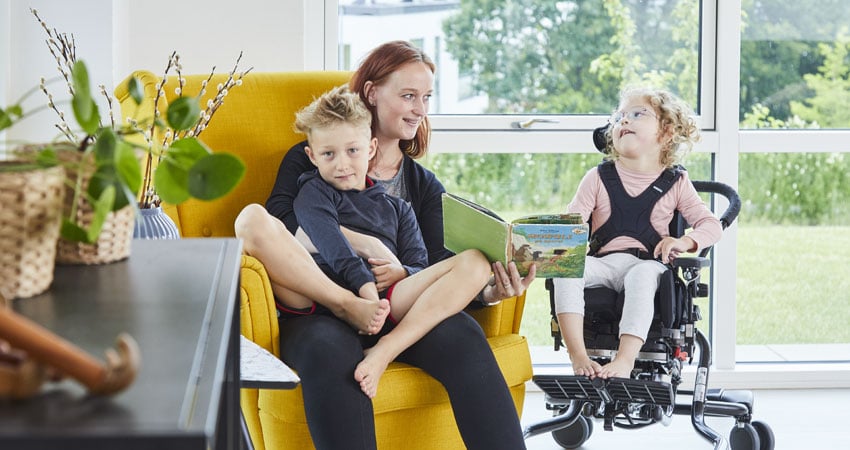
Alma's story and current abilities
Alma was born at Skejby in Aarhus three years ago. Today Alma lives with the consequences of stage V twin-to-twin transfusion syndrome, which caused the death of her twin sister Agnes.
The health conditions affecting Alma’s life include cerebral palsy and microcephaly, impacting her body functions and functional abilities to eat and drink, communicate, move, and perform self-care activities. However, when talking to Inge, the focus is how to get the best out of the situation, contribute to quality of life and enable Alma to be as independent as possible, rather than focusing on the limitations that follow living with a child with severe disabilities. This also means that medical devices have become a natural part of everyday life to support Alma’s development and give her the best opportunities to participate.
Alma uses R82 x:panda for sitting, the R82 Caribou for standing and the R82 Stingray for mobility. The individually adjusted support from the product solutions enable her to control the position of her head, arms and hands for shorter periods and use her arms and hands to activate the computer or hold on to objects, such as her teddy bear.
When she is on the floor mattress Alma lifts her head, pivot and sometimes turn from her stomach to her back. Alma communicated with us using sounds, eye contact and expressed clearly that she was interested and curious about the activities going on.
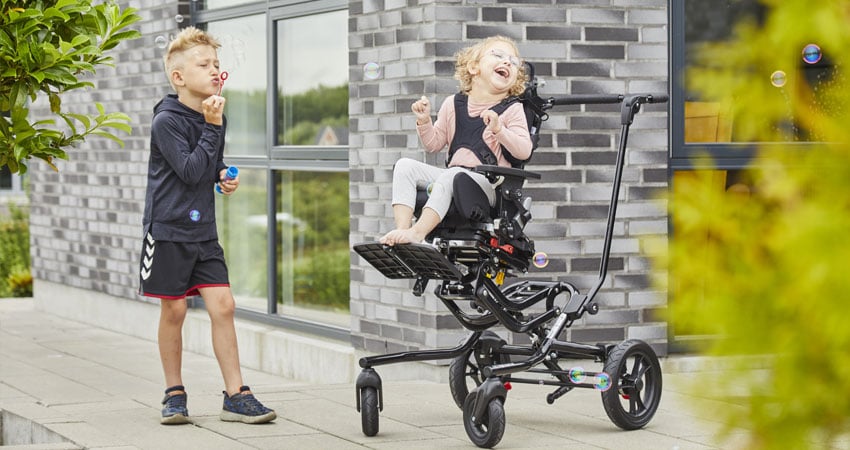
The x:panda on the High-low:xo
Inge assists Alma in being positioned close to Theodor and in the correct height to join in with the activities that he is engaged in. First at the sandbox for some playtime and later in the living room, while Inge reads a book out loud to Alma and Theodor.
The height adjustment is also an advantage for Inge when she positions Alma at the dinner table for eating and drinking, while also being tube feed. The highest and maximum backward tilted position of the seat is also very useful when Inge is brushing Alma’s hair. Hopefully the height adjustment can contribute to the health and wellbeing of Inge and enable her to continue to be Alma’s primary caregiver for many years to come.
The R82 High-low:xo outdoor can be used for Alma’s transport between home and kindergarten, while being supported in the seated position by her R82 x:panda seat. The bus picks her and a couple of friends up and bring them home aging in the afternoon, allowing them to arrive and leave together.
Facts
Twin-to-twin transfusion syndrome
Twin-to-twin transfusion syndrome (TTTS) is a rare pregnancy condition affecting identical twins or other multiples. The condition occurs in pregnancies where twins share one placenta and a network of blood vessels that supply oxygen and nutrients essential for development in the womb. These pregnancies are known as monochorionic.
Sometimes the vessel connections within the placenta are not evenly dispensed and there is an imbalance in the blood exchange between the twins. One twin — the donor twin — gives away more blood than it receives in return and runs the risk of malnourishment, organ failure and brain damage. The recipient twin receives too much blood and is susceptible to overwork of the heart and other cardiac complications.
The severity of the condition ranges from progressive blood volume imbalance, cardiovascular dysfunction to risk of death of one or both twins.
Reference: https://www.nhs.uk/pregnancy/your-pregnancy-care/antenatal-care-with-twins/
And https://twinstrust.org/site-search.html?q=ttts
Cerebral palsy
Cerebral palsy is the name for a group of lifelong conditions that affect movement and co-ordination, caused by a problem with the brain that occurs before, during or soon after birth.
The symptoms of cerebral palsy are usually not obvious just after a baby is born. They normally become noticeable during the first two or three years of a child's life.
Symptoms can include:
- Delays in reaching development milestones – for example, not sitting by eight months or not walking by 18 months
- Seeming too stiff or too floppy
- Weak arms or legs
- Fidgety, jerky or clumsy movements
- Random, uncontrolled movements
The severity of symptoms can vary significantly. Some people only have minor problems, while others may be severely disabled.
Related products
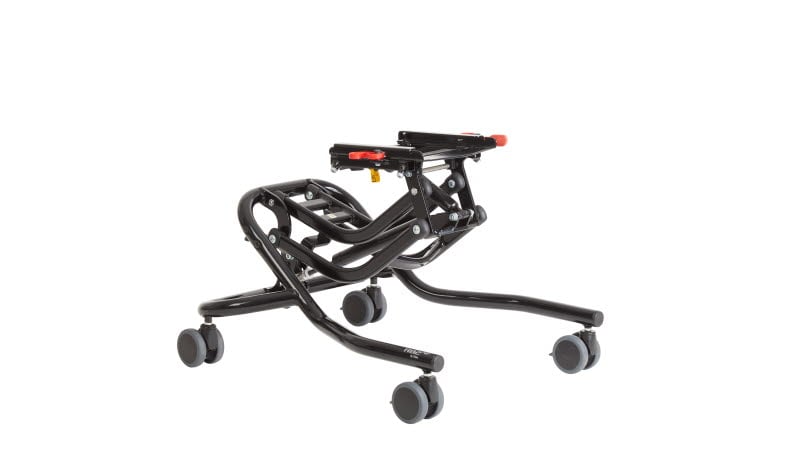
R82 High-low:xo
The High-low:xo frame is user friendly height adjustable frame that goes from floor to table height. The frame is available with either gas, power or hydraulic height adjustment.
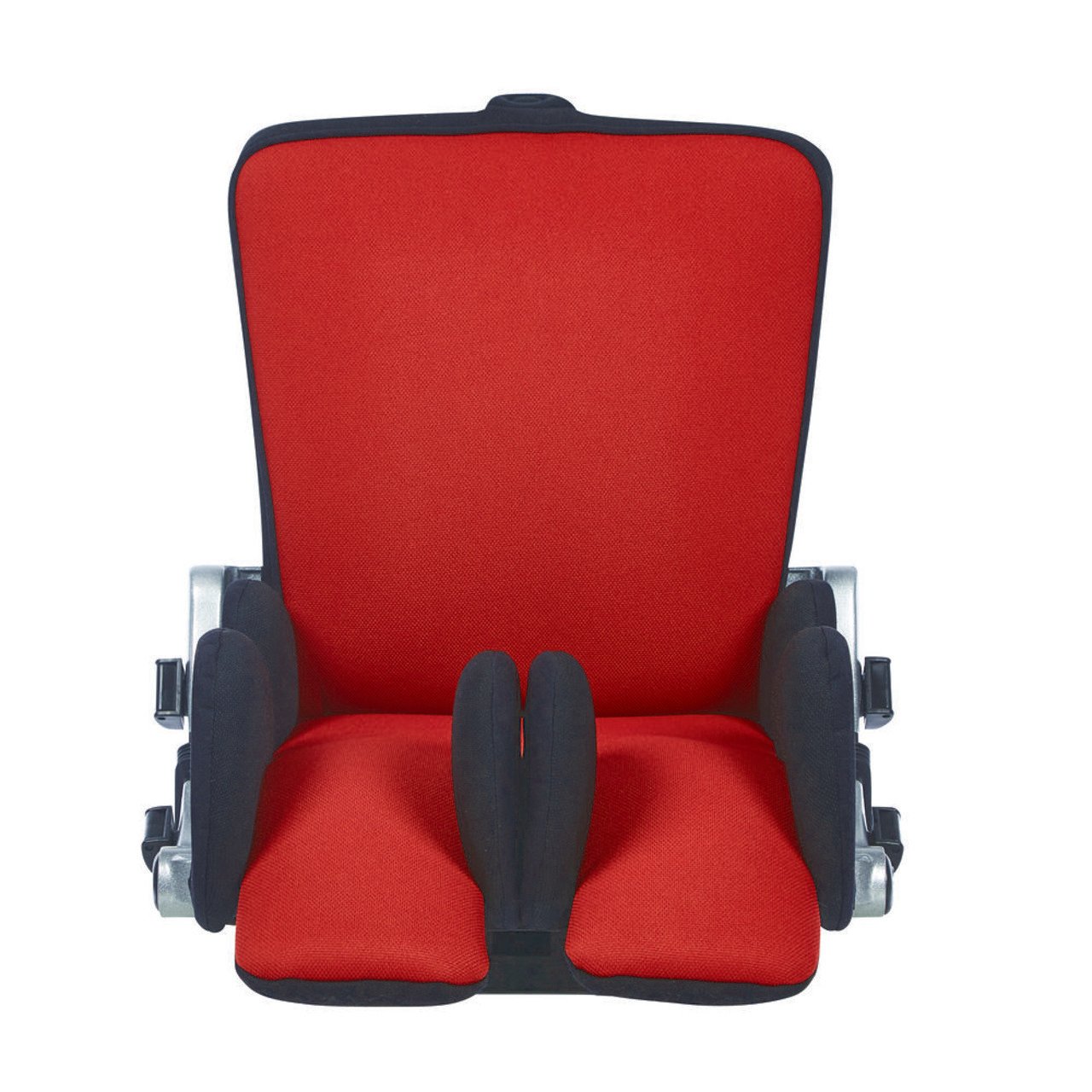
R82 - x:panda
The x:panda is a multi-adjustable dynamic seat, developed to establish an ideal seating position for children and youngsters living with a disability.
Please note
A case story is used to show an individual product solution and the experiences related to its use.
The configuration and use of the product, including its accessories is determined based on the preferences of the user, their healthcare professionals, the environment, constraints and local market-specific preferences. The case story is only a supplement to the product's manual/assembly instructions and does not in any way replace these instructions. Products, sizes, configurations, accessories shown might not be available on all markets. Please contact your local sales organization for updated information on availability in your country.